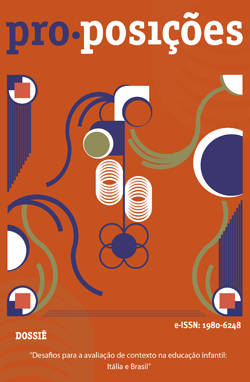Abstract
This article, linked to the field of Cultural Studies in Education, is part of the doctoral thesis of one of the authors and aims to analyze representations of people with visual disability in contemporary literature. Research data include the selection of work written by blind people or work with blind characters highlighted in the narrative. From the theoretical articulation to the analysis, we conclude that, although visual disability is historically represented as a defect that belittles the subjects, some blind authors represent blindness as a characteristic of subjects who have singular forms of being and of living in the world. Thus, we verified the appearance of other ways of representing blindness as being more than the idea of limitation or a problem to be corrected.
References
Arfuch, L. (2010). O espaço biográfico: dilemas da subjetividade contemporânea. Rio de Janeiro: EdUERJ.
Bauman, Z. (2003). Comunidade: a busca por segurança no mundo atual. Rio de Janeiro: Jorge Zahar.
Borges, Jorge Luis. (2009). La ceguera. In Siete noches (pp. 52-58). Madrid: Alianza Editorial.
Brasil. (2015). Lei brasileira de inclusão da pessoa com deficiência. Brasília, DF: Edições Câmara.
Doerr, A. (2015). Toda luz que não podemos ver. Rio de Janeiro: Intrínseca.
Domingues, C. A. (2010). A educação especial na perspectiva da inclusão escolar: os alunos com deficiência visual: baixa visão e cegueira. Brasília, DF: MEC; SEESP.
Dowker, A. (2013). A representação da deficiência em livros infantis: séculos XIX e XX. Educação & Realidade, 38(4), 1053-1068.
Hall, S. (2003). Introducción ¿Quien necessita “identidad”? In Hall, S., Du Gay, P. Cuestiones de identidad cultural. Buenos Aires: Amorrortu.
Hall, S. (2010). Sin garantias: trayectorias y problemáticas en estudios culturales. Lima: Instituto de Estudios Peruanos.
Hall, S. (2016). Cultura e representação. Rio de Janeiro: Ed. PUC-Rio; Apicuri.
Hingson, M. (2012). Adorável heroína. São Paulo: Universo dos Livros.
Kirchof, E. R., Bonin, I., & Silveira, R. M. H. (2013). Os deficientes na literatura infantil: tendências e representações. Aprender, (33), 113-122.
Lima, W. (2001). Luzes do arrebol: a saga do homem em busca de si mesmo. Porto Alegre: Sagra.
Linton, S. (2010). Reassigning meaning. In Davis, L. J. (Ed.). The disability studies reader. New York: Routledge.
Lobo, L. F. (2008). Os infames da história: pobres, escravos e deficientes no Brasil. Rio de Janeiro: Lamparina.
Meruane, L. (2015). Sangue no olho. São Paulo: Cosac Naify.
Mianes, F. L. (2015). Marcas de identificação em narrativas autobiográficas de pessoas com deficiência visual. Tese de Doutorado, Universidade Federal do Rio Grande do Sul, Porto Alegre.
Shakespeare, T. (2010). The social model of disability. In Davis, L. J. (Ed.). The disability studies reader. New York: Routledge.
Silva, T. T. (1995). Currículo e identidade social: territórios contestados. In Silva, T. T. (Org). Alienígenas na sala de aula: uma introdução aos estudos culturais em educação. Petrópolis: Vozes.
Silveira, R. M. H, & Kirchof, E. R. (2016). Literatura infantil e educação: ensinando através de personagens diferentes. Em Aberto, 29(95), 41-52.
Valle, J. W., & Connor, D. J. (2014). Ressignificando a deficiência: da abordagem social à prática inclusiva na escola. Porto Alegre: AMGH.
Vygotsky, L. (1991). A formação social da mente. São Paulo: Martins Fontes.
Wieviorka, M. (2002). A diferença. Lisboa: Fenda Edições.
A Proposições utiliza a licença do Creative Commons (CC), preservando assim, a integridade dos artigos em ambiente de acesso aberto.


